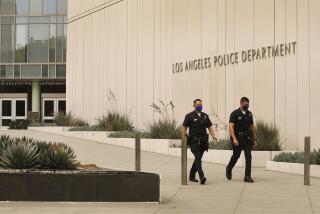Hackers publish private information about L.A. police officers
The FBI is probing an Internet breach in which hackers publicly posted private information belonging to more than 100 local law enforcement officers who are part of the Los Angeles County Police Canine Assn.
Tony Vairo, a San Fernando police officer and president of the group, told The Times that they were contacted by the FBI Tuesday morning informing them that information belonging to its members, who include LAPD officers the and Los Angeles County Sheriff’s deputies, had been compromised.
“I’m appalled that our website was breached,” Vairo said. “It’s not right and we will pursue it on every level, state or federal.”
Vairo described the FBI probe into the hacking incident as being part of an ongoing criminal investigation. FBI spokeswoman Laura Eimiller would not comment on what, if any, involvement the agency had in the case.
The incident, first reported Tuesday by CNET.com, comes two months after personal information about more than two dozen members of the Los Angeles Police Department’s command staff was anonymously posted on an Internet site.
In that case, the hackers posted officers’ property records, campaign contributions, biographical information and, in a few cases, the names of family members, including children. But that information was gleaned from public records.
Authorities said the current intrusion is different because the information gleaned from the association’s website was not available to the public.
Marshall E. McClain, president of the Los Angeles Airport Peace Officer’s Assn., which has three members whose information was compromised, said his association has contacted the Los Angeles County district attorney’s office to ask for a criminal investigation.
The postings were linked to from a publicly available Twitter account, where unnamed activists claimed responsibility for the information dump. The information was posted on a site that allows users to anonymously input data. This type of site has increasingly been used to post personal information of individuals who raise the ire of online activists. The practice is known as “doxing.”
More to Read
Start your day right
Sign up for Essential California for news, features and recommendations from the L.A. Times and beyond in your inbox six days a week.
You may occasionally receive promotional content from the Los Angeles Times.






